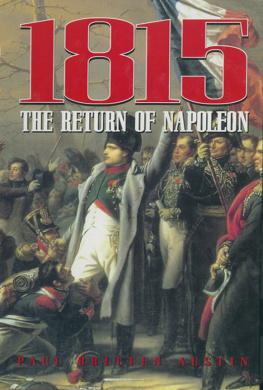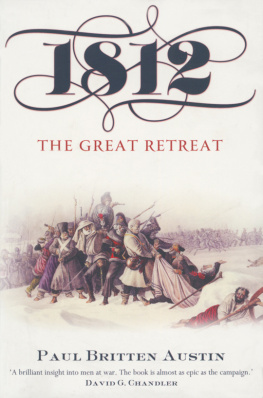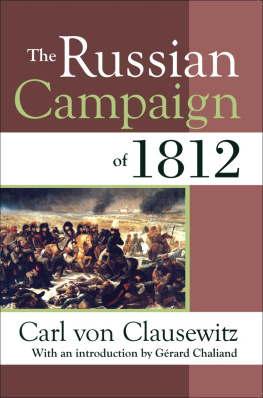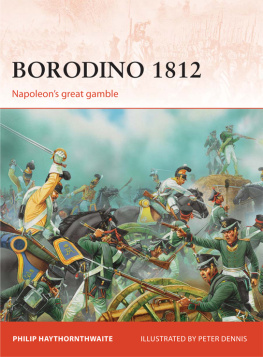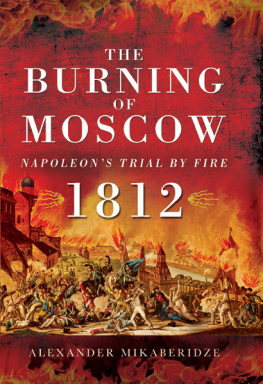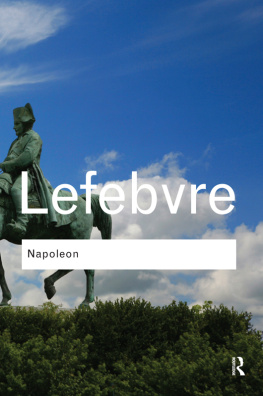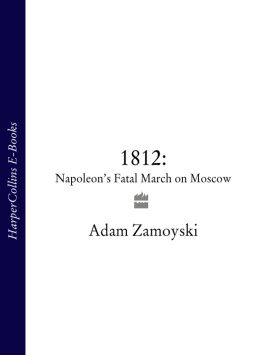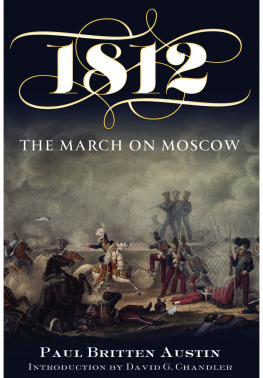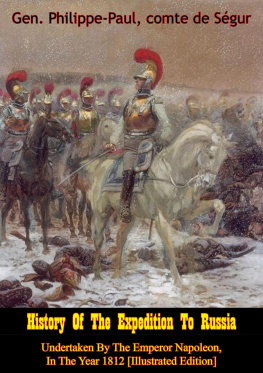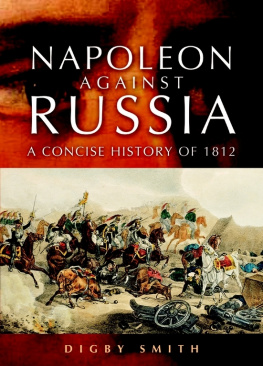Paul Britten Austin - 1812: Napoleon in Moscow
Here you can read online Paul Britten Austin - 1812: Napoleon in Moscow full text of the book (entire story) in english for free. Download pdf and epub, get meaning, cover and reviews about this ebook. year: 2013, publisher: Frontline Books, genre: Detective and thriller. Description of the work, (preface) as well as reviews are available. Best literature library LitArk.com created for fans of good reading and offers a wide selection of genres:
Romance novel
Science fiction
Adventure
Detective
Science
History
Home and family
Prose
Art
Politics
Computer
Non-fiction
Religion
Business
Children
Humor
Choose a favorite category and find really read worthwhile books. Enjoy immersion in the world of imagination, feel the emotions of the characters or learn something new for yourself, make an fascinating discovery.

- Book:1812: Napoleon in Moscow
- Author:
- Publisher:Frontline Books
- Genre:
- Year:2013
- Rating:5 / 5
- Favourites:Add to favourites
- Your mark:
- 100
- 1
- 2
- 3
- 4
- 5
1812: Napoleon in Moscow: summary, description and annotation
We offer to read an annotation, description, summary or preface (depends on what the author of the book "1812: Napoleon in Moscow" wrote himself). If you haven't found the necessary information about the book — write in the comments, we will try to find it.
1812: Napoleon in Moscow — read online for free the complete book (whole text) full work
Below is the text of the book, divided by pages. System saving the place of the last page read, allows you to conveniently read the book "1812: Napoleon in Moscow" online for free, without having to search again every time where you left off. Put a bookmark, and you can go to the page where you finished reading at any time.
Font size:
Interval:
Bookmark:
1812
NAPOLEON IN
MOSCOW
PAUL BRITTEN AUSTIN
A brilliant insight into men at war. The book is almost as epic as the campaign.
DAVID G. CHANDLER

FRONTLINE
BOOKS
A Greenhill Book

Greenhill
Books
First published in Great Britain in 1995 by
Greenhill Books, Lionel Leventhal Limited
www.greenhillbooks.com
This paperback edition published in 2012 by
Frontline Books

an imprint of
Pen & Sword Books Ltd
47 Church Street
Barnsley
South Yorkshire
S70 2AS
Copyright Paul Britten Austin, 1995
The right of Paul Britten Austin to be identified as the author
of this work has been asserted by him in accordance with the
Copyright, Designs and Patents Act 1988
ISBN 978-1-84832-703-0
All rights reserved. No part of this publication may be reproduced, stored in or introduced into a retrieval system, or transmitted, in any form, or by any means (electronic, mechanical, photocopying, recording or otherwise) without the prior written permission of the publisher. Any person who does any unauthorized act in relation to this publication may be liable to criminal prosecution and civil claims for damages.
CIP data records for this title are available from the British Library
For more information on our books, please visit
www.frontline-books.com, email info@frontline-books.com
or write to us at the above address.
Printed and bound by CPI Group (UK) Ltd, Croydon, CR0 4YY
True historians arent those who relate overall facts and limit themselves to general causes; but those who pursue facts down to their most detailed circumstances and reveal their particular causes.
Giambattista Vico
Human life is short and fleeting, and many millions of individuals share in it who are swallowed up by that monster of oblivion which is waiting for them with ever-open jaws. It is thus a very thankworthy task to try to rescue something of the memory of interesting and important events, or the leading features and personages of some episodes from the general shipwreck of the world.
Shopenhauer
To my son THOM
and my grandson BENNY
without whose patient encouragement
and computer expertise this work
would never have been possible.
T his book is the successor to 1812: The March on Moscow. A kind of word-film or drama documentary, its edited, I hope not too inartistically, from the first-hand accounts of well over 100 of the participants, both French and allied, in the vast mass-drama of Napoleons invasion of Russia.
Ive resisted the temptation to comment on or evaluate their narratives. All strike me as authentic if not necessarily accurate, and certainly not impartial. The events, after all, were extraordinary beyond imagining. And allowances must be made for hindsight. Its so easy to be wise after the event!
For reasons of space, Ive seen it all from one side only with a single co-opted witness from the Russian side in the highly critical, not to say caustic, person of General Sir Robert Wilson, the British representative at Kutusovs headquarters.
After the briefest of intermissions I resume in this volume exactly where its forerunner left off: at the gates of Moscow. At the head of his central army, originally some 350,000-strong and made up of Davouts I, Neys III, Prince Eugnes IV, Poniatowskis V, and Junots VIII Corps and the Imperial Guard, and spearheaded by Murats four reserve cavalry corps, Napoleon had crossed the Niemen on Midsummers Day. But the Tsars 1st and 2nd West Armies had refused him the pitched battle which, as twice before, would certainly have crushed them, and retreating separately eastwards, forcing him to follow in search of the resounding victory which was to force Russia back into his Continental System and prime objective of the whole unprecedentedly vast and ever farther-flung campaign compel Britain to make peace. Far away to the south, meanwhile, Schwarzenbergs Austrians and Reyniers Saxons (IX Corps) had quickly got bogged down manoeuvring against Tormassovs 3rd West Army which, if Russia and Turkey hadnt unexpectedly made peace, should have been fighting the hereditary foe in Moravia. To the northwest Macdonalds X Corps, mostly made up of Prussians, had invested Riga; while Oudinots II and St-Cyrs VI Corps had pursued Wittgenstein through the blazing summer heats and, ravaged by sickness, also got bogged down at Polotsk.
On 28 July the main body, under Napoleon himself, had again been refused battle outside Witebsk; and after a ten-day pause there to recuperate, the advance had gone on. Napoleon had manoeuvred to circumvent Barclay de Tollys 1st and Bagrations 2nd West Armies and snatch Smolensk, but failed. There, at last, on 17 August, the pitched battle he had been longing for was fought indecisively. Smolensk, Russias third largest city, had gone up in flames; and again the Russians had withdrawn in almost miraculously excellent order, leaving Napoleon no option (in view of the acute political hazards of staying where he was, so remote from his bases, and of the disastrous likelihoods if after all this marching and fighting he withdrew) but to push on eastwards and strike for Moscow. Once it had been occupied, he was sure, his brother Alexander would have to make peace. On 7 September the Russians had at long last stood and fought at Borodino, one of the bloodiest one-day battles of modern times and of which one could paradoxically say it had neither been won, lost nor drawn. Again the Russian army had retired intact and certainly not beaten. And on 14 September a parley outside the gates of Moscow had led to a brief truce. Under it Murats advance guard at least two-thirds of whose horses were either dead of thirst, hunger, overwork or neglect, or had fallen at Borodino was to follow on at the heels of the Cossacks rearguard through the eerily deserted city.
Its at this for all my protagonists keenly anticipatory moment outside the gates of Moscow a moment when Napoleons face, normally so impassive, showed instantly and unmistakably the mark of his bitter disappointment [Caulaincourt] that they resume, exactly where they finished in the previous volume, their multifarious story.
For the sake of new readers, but I hope without becoming tedious to those whove so patiently read my first volume, Ive tried to re-identify, in passing, at least the most important of my eyewitnesses by italicizing their names at their first reappearance. For bibliographical details of these and other sources, see the Bibliography (which, it should be noted, is supplementary to the fuller one in my first volume, which itemizes them all). As in The March, there is also an Index, by means of which the reader can, if he likes, follow our protagonists individually. At the same time I have of course tried to keep him informed as to the ongoing military situation.
In the interests of narrative pace, while always preserving my narrators exact sense, Ive sometimes taken liberties with the order of their words, phrases and even sentences. A little reflection will show why Ive had to do this. A longish quotation may very well start where I, as film editor, want to cut it into my overall narrative; but very likely it will soon stray off into some other direction than the overall one it is necessary for us to follow. Hence my unorthodox use, made in good faith, of some of these translated passages which none the less form the essence of my tale.
Font size:
Interval:
Bookmark:
Similar books «1812: Napoleon in Moscow»
Look at similar books to 1812: Napoleon in Moscow. We have selected literature similar in name and meaning in the hope of providing readers with more options to find new, interesting, not yet read works.
Discussion, reviews of the book 1812: Napoleon in Moscow and just readers' own opinions. Leave your comments, write what you think about the work, its meaning or the main characters. Specify what exactly you liked and what you didn't like, and why you think so.

